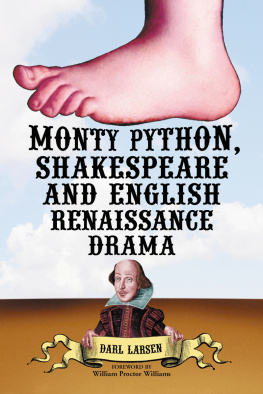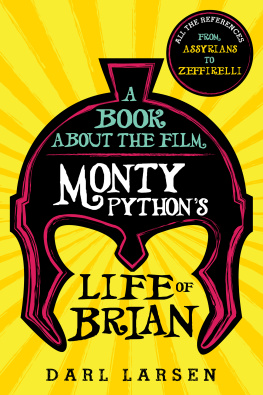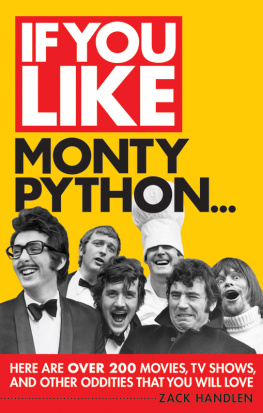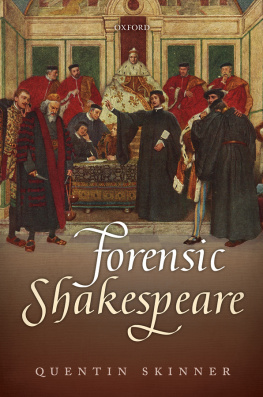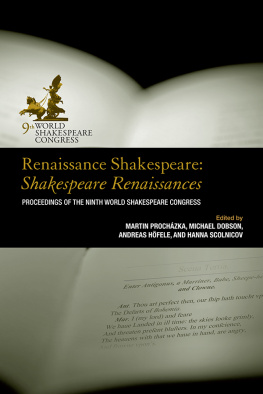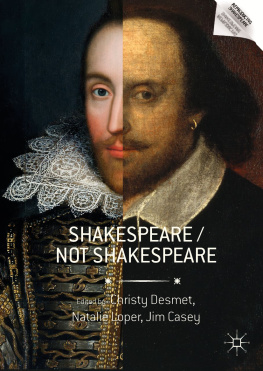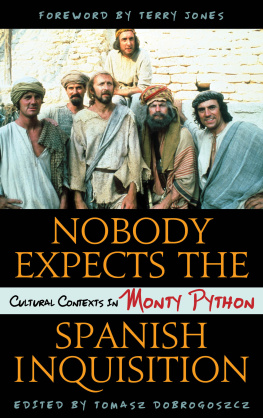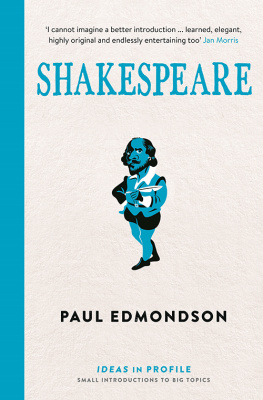
Monty Python, Shakespeare and English Renaissance Drama
DARL LARSEN
FOREWORD BY WILLIAM PROCTOR WILLIAMS

McFarland & Company, Inc., Publishers
Jefferson, North Carolina
LIBRARY OF CONGRESS CATALOGUING DATA ARE AVAILABLE
BRITISH LIBRARY CATALOGUING DATA ARE AVAILABLE
e-ISBN: 978-0-7864-8109-5
2003 Darl Larsen. All rights reserved
No part of this book may be reproduced or transmitted in any form or by any means, electronic or mechanical, including photocopying or recording, or by any information storage and retrieval system, without permission in writing from the publisher.
On the cover: Images from Art Today 2003 and PhotoSpin 2003
McFarland & Company, Inc., Publishers
Box 611, Jefferson, North Carolina 28640
www.mcfarlandpub.com
For Nycole, Keir, Emrys,
Brynmor, Eamonn, Dathyl,
Ransom, and Culainn
Acknowledgments
I would be remiss if I did not give thanks for the inestimable assitance I received as this book progressed.
I owe a debt of gratitude to Dr. William Proctor Williams, formerly of Northern Illinois University, whose classroom discussions helped shape this challenging topic, and who read and responded to every word. The subject matter raised more than a few academic eyebrows, but Dr. Williams pushed us on anyway. His passion for the subjectsShakespeare, Jonson and just English Renaissance drama and Monty Python in generalmade the process fun.
I thank my parents, Dr. Norbert William and Patricia Tenney Larsen, who were a constant support and tireless cheering section. Their help was financial, emotional, spiritual, and always gladly offered. It will always be gratefully remembered.
A special thanks must go to my wife, Nycole, and my wonderful children Keir, Emrys, Brynmor, Eamonn, Dathyl, Ransom, and Culainn. They all moved where and when I needed to move, and back again, and just plain endured me. Nycole was and is certain there are no challenges we cannot overcome, and this work is dedicated to the whole family.
Also included in my thoughts are Jan Arwood, Dr. Robert Self, the NIU English Department faculty and staff, Maria Krull, Dr. Robert Nelson, my brother Mark, sisters Stacey, Liesl, Amalie, Katie and their families, Lynn and Maude Tenney, and Daniel and Monica Malcolm. They all helped in meaningful ways.
Foreword
On my shelves I have a book which proclaims on its front cover The Complete Works of Shakespeare and Monty Python, vol. I, Monty Python, published in 1981. According to WorldCat (OCLC), twelve libraries in the world hold this volume, among them the New York Public Library, Yale University, the Bodleian Library, and the British Library. It is not held, apparently, by the Folger Shakespeare Library nor by the Shakespeare Collection at the University of Birmingham. It is not to be found in the World Shakespeare Bibliography Online, whose coverage is now 1971 to 2002. This is odd, for my copy has a charge slip from the Ferndean School Library pasted onto the front endpaper indicating that between 17 November and 12 February of some year the book was checked out by W. H. Auden, J. P. Sartre, E. Waugh, S. Davis, Jr., D. G. Rosetti, and others. However, the last person to check this book out is one M. Thatcher on 12th Feb. (there is no indication that she ever returned it), and we know that one Margaret Hilda Thatcher told, not very well, the Dead Parrot joke in 1990 and by the end of that year she had had to resign as Prime Minister of the United Kingdom. There could hardly be better evidence of the importance of Monty Python for our national, and international, identity. Would the same thing have happened had she told the Who Builds Stronger joke (What is he that builds stronger then eyther the Mason, the Shypwright, or the Carpenter [TLN 323031]) from Hamlet? Perhaps.
There has long been a denial of the importance of Shakespeare to Monty Python studies. Professor Larsens study will go some way toward ending this division between the two cultures. Just as Shakespeare has so penetrated our language and culture that phrases from his works have been used to sell everything from small cigars to sewing machines, so the Pythons work has wormed its way into contemporary culture. Saying that something has two important points and then finding that it actually has three will often produce the phrase No one expects the Spanish Inquisition; easy cowardice may produce Run away, run away, from Monty Python and the Holy Grail; any sort of odd gait may be identified as being from the Ministry for Silly Walks. In a program presented by Carol Cleveland on BBC Radio 4 (Tuesday, September 14, 1999, 11:30 A.M., BST) called Long Live the Dead Parrot the Pythons career is discussed, and tellingly the question is asked why the Gumbies should still be popular in Latvia, or killer sheep in Slovakia? John Cleese provides a sentiment which, I think, would have been completely understood by Shakespeare: The nicest thing I ever heard about Python was that people said that after they watched a Monty Python show, they couldnt watch anything else on television that night and take it seriously and I thought thats a great thing to have achieved. It is certainly the case that when the Pythons presented live shows in the United States they found that members of the audience could complete their lines for them. One is reminded of John Mortimers story of his blind fathers unnerving ability to audibly say the actors lines a split second early during live Shakespeare performances at Stratford.
What Professor Larsen has discovered and what he presents in this book are not merely examples of intertextuality, but an interpenetration of aspects of culture. On that same Radio 4 program the standup comedian Arnold Brown says of Python:
It was about types, it was about class, it was about history. They were satirizing, in a kind of surreal way, what they had been taught, all the educational valuesthe religion, the attitudes, the middle-class attitudes, and one guy in particular epitomizes this, John Cleese. And I used to be an accountant, and accountancy was being satirized because it epitomized this conformity, and it was a stifling conformity. And John Cleesethis anger welled up in him, and he created all these marvelous anti-establishment, anti-civil servant, anti-accountancy caricatures.
This is not much different from Hamlets view of things:
The oppressors wrong, the proud mans contumely,
The pangs of despised love, the laws delay,
The insolence of office, and the spurns
That patient merit of the unworthy takes [3.1.7174].
Professor Larsen sees this similarity and provides the reader with a way of understanding it.
It is odd that the parallels have been so long unnoticed. Shakespeare, a most subversive writer, worked from within the establishment (the Kings Men were, of course, minor members of the Court) to expose the various and numerous hypocrisies of his age; the Pythons worked just as subversively, though perhaps more openly, from within one of the greatest establishments of our own day, the British Broadcasting Corporation. Macbeth can be seen as a daring expos of the essentially false and lying nature of witchcraft (equivocation, the use of ambiguity to mislead, is not the same as witchcraft, supernatural power and influence: the Master of the Tiger cannot lose his ship though he may be discomforted, TLN 12223) presented before a king, James I, who in 1597 had published a book,
Next page
